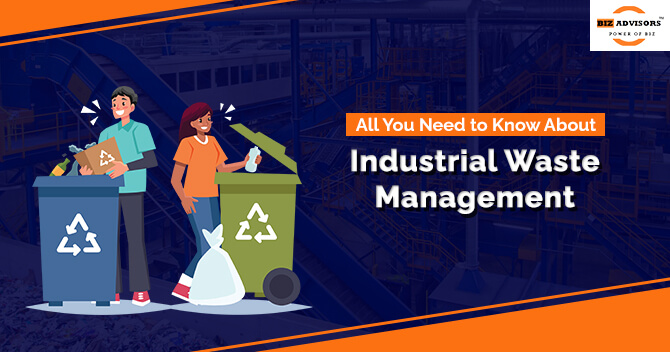Industrial Waste Management imparts an unambiguous picturesque concerning the structural framework of scrutinizing and analyzing the legalese of operational management of waste substances that discharges from multifarious channels of industries and factory outlets. Industrial Waste Management comprehensively prepares a platform for regulating the policies concerned with bringing into light an efficacious model of waste management. It lays out a systemized regulatory framework for trivializing the harmful effects of waste that is brought into rivers by industries. Industrial activities affect environmental sustainability on a wide scale because unregulated industrial waste is one of the stumbling blocks in the vitality and vibrancy of species and the protection of biological resources. Industrial Waste Management prepares a substratum for a robust environmental balance in terms of maintaining the integrity of the environment to a certain extent and ensuring a fair interplay of species within the ecosystem.
Industrial Waste Management
The industrial revolution in the 18th century changed rural areas into industrialized and urban ones. However, this development also brought up a serious problem and a threat to our environment, namely the trash produced by industries. Industrial waste is the trash produced by commercial and industrial operations.
Waste of every kind is produced by a wide range of sources, such as manufacturing companies, various mills, mines, power plants, etc. To safeguard ourselves and our environment, it produces solid, liquid, and gaseous wastes such as ashes, industrial effluent, chemicals, carbon dioxide, sulfur dioxide, and other things that must be broken down or handled.
Industrial Waste Management is a necessity for all production enterprises. Since they frequently endanger the environment or people’s health, these undesired by-products of industrial operations must be managed and disposed of carefully.
Advantages of Industrial Waste Management
- Waste reduction- It is one of the most effective ways to lower the cost of disposing of industrial waste. A wide range of industries is continually looking for new manufacturing methods that are more efficient and produce less waste. These modern techniques not only consume fewer raw materials but also cost less for these businesses to store or dispose of industrial waste.
- Recycle – Waste recycling is a well-liked way of waste disposal for various non-hazardous trash categories. The things that can’t be recycled must be thrown away in another way.
The elements that are regularly recycled:
- Paper
- Aluminum
- Certain electronic parts
- Polycarbonate
- A non-tempered glass
- Prospects for new employment- The processes of Industrial Waste Management, including transportation, processing, and resale, all call for individuals with a variety of talents In comparison to landfills and incinerators, recycling and reuse produce at least nine times as many jobs, and maybe up to thirty times as many.
- Maintain Compatibility – Regional, provincial, and municipal governments enforce varied waste rules for the preservation of the environment and the welfare of the community. These requirements will vary among businesses depending on the garbage that various processes produce. By using sound waste management techniques, your company may meet these standards and stay out of trouble in the future.
Essential Documentation concerning the Industrial Waste Management
The documents listed below are necessary for Industrial Waste Management:
- Signed Application to the Pollution Control Board
- The unit’s site plans detailed information on probable point sources for the production of hazardous waste, solid waste, air pollutants, and effluent discharge is included in the project report layout design.
- A list of the equipment and details on the production process
- Information about the water balance, the water’s source, and the required quantity
- Land documents, such as leases or rental agreements
- Register for the industry
- Consent fee payment (as applicable)
- GST Certificate Process Flow Chart
- A PAN Card of the Signatory
- Information about Installed Machinery
- Ownership documentation or a lease or rental agreement
- Anything else on the application described as documentation
Standards for the Industrial Waste Management
The following are the requirements/standards for Industrial Waste Management:-
Pain Factors- You must identify the processes that you find difficult to implement before creating a management plan. You might find it challenging to follow a tank cleaning schedule, or you might have more liquid waste than you know what to do with. Following government requirements on proper waste disposal, in addition to other regulatory procedures, may be difficult.
Creating Baselines- How much garbage can your company tolerate before it is too much to handle? Depending on the kind of business you run, you may want to impose different limits on the amount of trash that can build up at your facility.
Knowing your waste thresholds- It will enable you to decide which wastes need more attention than others and how much waste is acceptable before it becomes hazardous.
Frequency – Using the thresholds you’ve established, you can schedule your waste management processes. Consider how regularly you produce various types of trash and how frequently you’ll need to respond.
Collaboration – Once you’ve determined your pain points, thresholds, and frequency ranges, you may enlist the aid of waste management organizations or TSDFs to help you implement your plan. Professionals in management and recycling can provide resources that your company may not have, ensuring that your business is always operated in a safe, legal, and efficient manner.
Procedure
Trash characterization is necessary to evaluate the many types of waste your facility generates, its degree of production, and the most effective management approach.
One example of a specialist consultant utilized in the characterization process is an engineer with substantial process knowledge.
A member of the sample team; a representative of quality assurance
The following procedures should be taken into account to control industrial waste:
- Assessment- Waste that is recyclable or biodegradable is stored separately after being separated from industrial waste through analysis. According to SWM Rules, businesses should classify rubbish into a variety of categories at the source, including hazardous waste, non-biodegradable waste, and biodegradable waste[1].
- Collection and Transportation – Industrial trash needs to be collected, sorted, and transported to facilities that handle the waste.
- Restoration- Recovery work needs to be done in waste-management facilities. The processing of industrial wastes in waste management facilities should recover valuable and recyclable materials, according to this.
- Recycling and Disposal- If any significant objects are found during recovery, hazardous waste recycling or disposal should be carried out.
Conclusion
The aforementioned text provides an apparent picturesque concerning Industrial Waste Management. It delineates multitudinous provisions relating to the systematic regulation of waste products that are discharged by industries on a wide platform. It helps in the smooth and efficient operational management of industrial waste substances, which makes the progressive spirit of the environment decrepit at large.
Our legal luminaries at BizAdvisors.io provide a robust support system in the context of assisting individuals to easily get a brief outlet of Industrial Waste Management. You can freely contact our legal consultants at BizAdvisors.io for any kind of professional assistance or help in the context of understanding the subject matter of Industrial Waste Management. Our structural management personnel tends to provide variegated services, such as laying out standards and protocols for the ideal functioning of industries in terms of regulating waste for reinforcing the concept of Industrial Waste Management.
Read our article:All You Need to Know About Land Waste Management
 9559179325
9559179325 9559179325
9559179325





